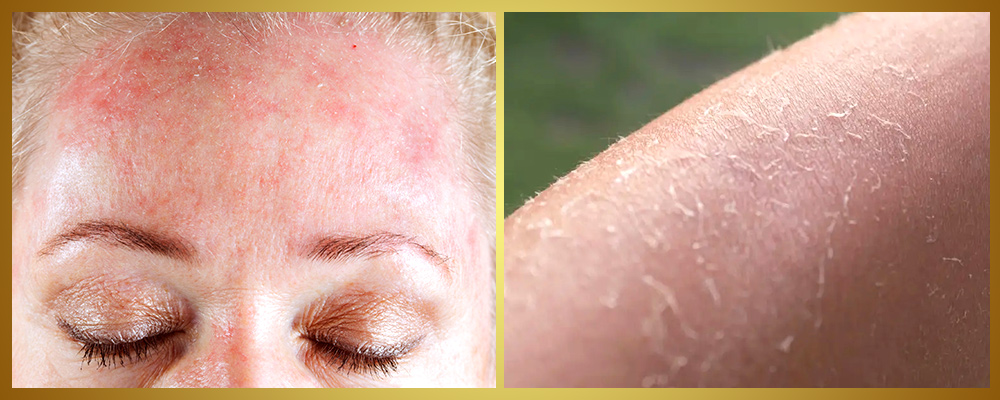Table of Contents
Dry Skin: Types, Symptoms and Causes
Dry skin looks and feels rough, itchy, flaky, or scaly. It can appear in different areas on different people and affects people of all ages.
Causes:
1. Cold or dry weather
2. Sun damage
3. Harsh soaps
4. Overbathing
Management:
1. Moisturize: Use lotions or creams regularly.
2. Sun Protection: Protect your skin from the sun year-round.
Experiment with different products and routines to find what helps your skin the most.
Symptoms

a. Tightness: Skin feels tight.
b. Rough Texture: Skin feels and looks rough.
c. Itchiness: Skin itches.
d. Flaking: Skin flakes off, which can look ashy on darker skin.
e. Scaling: Skin may peel or scale.
f. Cracking: Skin can have a cracked, “dry riverbed” look, especially on legs.
g. Fine Lines: Small lines or cracks may appear.
h. Color Changes: Skin can look reddish on light skin or grayish on darker skin.
i. Bleeding: Deep cracks may bleed.
When to see a doctor
1. No Relief: Home remedies don’t work.
2. Pain or Swelling: The skin is sore or swollen.
3. Cancer treatment: Dry skin from cancer treatment.
4. Discomfort: Affects sleep or daily life.
5. Infection: Scratching causes sores or infection.
6. Large areas: Large patches or peeling of skin.
Causes
Dry skin happens when your skin loses moisture. Common causes include:
a. Heat: Reduces humidity, drying skin.
b. Cold Weather: Wind and low humidity can dry skin.
c. Over-bathing: Long, hot showers strip natural oils.
d. Harsh Products: Soaps and detergents that remove oils.
e. Skin Conditions: Eczema and psoriasis increase dryness.
f. Medical Treatments: Some treatments or medications cause dry, thick skin.
g. Aging: Skin thins and produces less oil as you age.
Diagnosis
To diagnose dry skin, your doctor may examine you and ask about your medical history.
They ask when your dry skin started, what effects it has, how you shower, and how you take care of your skin.
Testing may be needed to determine if dryness is caused by a medical condition such as hypothyroidism, or if it is associated with skin conditions such as eczema and psoriasis
Treatment
Dry skin generally improves with lifestyle changes such as using moisturizers and avoiding hot baths over time. If you have very dry skin, your doctor may recommend a specific moisturizer.
If the skin condition is severe, prescription medications or ointments may be necessary.
Hydrocortisone medication can help with skin irritation, and if you have breakouts, a liquid skin bandage may be prescribed to keep the infection at bay.




